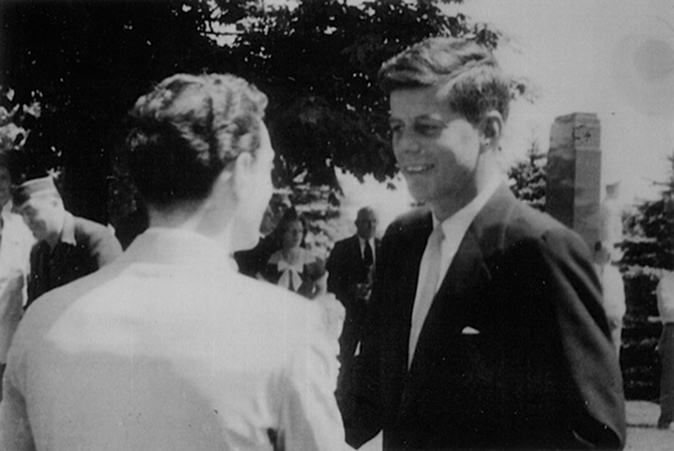
Dear Blog Readers: Following my post yesterday on the career of CBS Cameraman Mario Biasetti, I got some comments from women readers asking about the women in Mario’s life. I promise in upcoming posts I will fill you all in on Mario’s Italian-American Mamma, Mario’s talented and forbearing Connecticut Yankee wife, some of the powerful women Mario has covered and some women who with strength and determination have broken into Mario’s field.
PART II – COVERING MOVERS AND SHAKERS WITH GRACE AND GRIT
As the CBS man in Boston, Mario Biasetti was assigned to cover JFK’s presidential campaign. He was amused how in the early years nobody paid attention to the young JFK when he campaigned through the streets of Boston. Mario told me,
“I watched him stand at Downtown Crossing between Filenes and Jordan Marsh and say, “Hello, my name is Jack Kennedy…” “So what…” they’d say, “why don’t you get lost” and walk away. Bostonians, not the Irish Bostonians, did not seem to care about this young guy. I’d say “y’ know Jack, I could never do that”, but Jack was tough. He was a killer politically.”
Mario knew his limits with both Jack and Jackie. He told me he knew all about Jack’s women but back in those days, that was not to be reported.
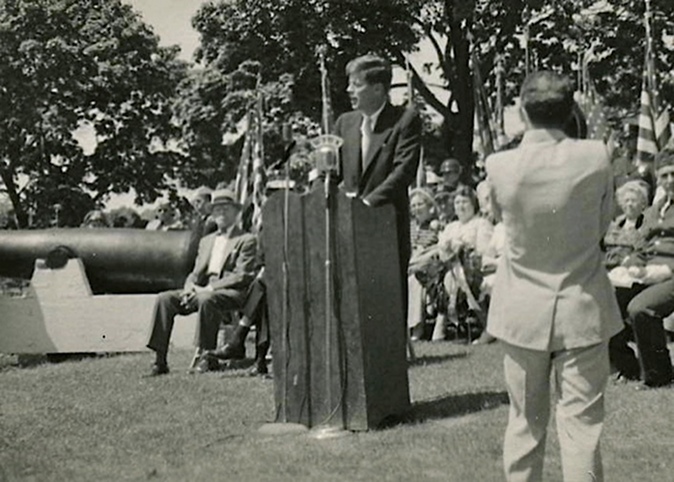
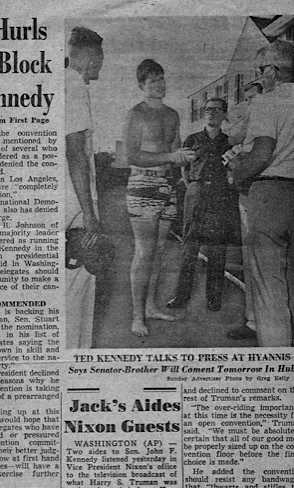
5) It can be hard for journalists to figure out which rules they need to follow when covering famous figures. What is important for the public to know and how much privacy should be respected. Covering the Vatican I have found there are a lot of rules for journalists that must be respected. Journalists who are physically near the Pope at events must be dressed in black and well-covered (See Watch Your Tongue, Hands and Eyes). If one does not follow these rules, it creates problems for everyone. Respecting privacy can also be a fine line for television journalists. During the final years of the papacy of John Paul II we often found it hard to know what were the limits of privacy. John Paul II was in bad physical condition at the end, frequently completely bent over during mass, having great difficulty speaking. Sometimes he would appear to nod off or would drool. How much of this should one broadcast, or ,out or respect for the individual, leave out? The rules on politician’s privacy have changed dramatically since the 1960s.
As he says, “In those days the media was very careful not to needlessly invade an individual’s privacy. We all knew of Kennedy’s women, Jackie’s pay-back affair with a security guard, Eisenhower’s woman, etc. etc., but nobody breathed a word about it.”
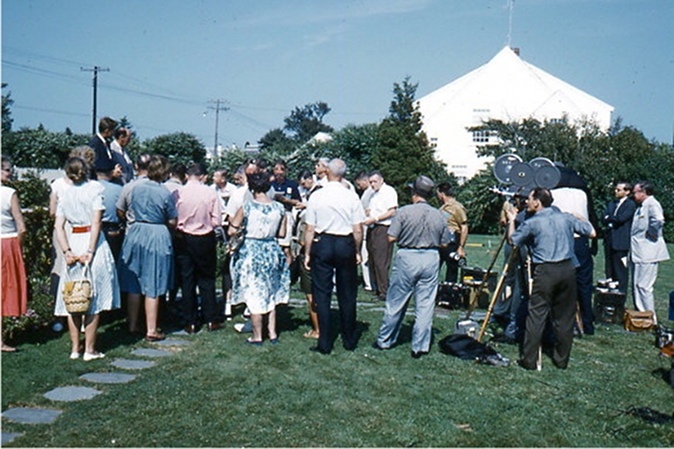
Mario continued to cover JFK as President when he came to the Boston area, particularly on vacation in Hyannisport.
As Mario walked across the lawn towards the beach carrying his camera, he saw the President and First Lady walking ahead of him unaware of his presence. She was very pregnant. When they reached the shore, JFK rolled up his pants, and picked up the pregnant First Lady and carried her about 10 yards out to a flat-bottomed rowboat. Mario filmed the whole thing and was convinced he would win the Pulitzer Prize for capturing the President of the United States in such a tender gesture. But as Jackie sat down in the rowboat she looked up, saw Mario, and had a fit. The President turned around and yelled, “Mario get rid of that!” So he did, pulling out the film right there on the beach.
As much as Mario was fond of Jack, his relationship with Jackie was distant. He says he found her to be uninterested in individual journalists but very interested in the image they might be projecting of her. Years after this incident with Jackie, he would come face to face with her again on the Greek Island of Skorpios, just after she announced her engagement to Aristotle Onassis.
A little personal note here. I grew up in the Boston area and was raised on the Kennedy- Camelot myth. For me Jackie Kennedy was always the essence of elegance and glamour. As so many young girls growing up in the 1970s in Boston, I wanted to be like her. Over the years the myths surrounding John F. Kennedy have been debunked. We now know the most salacious details of Jack Kennedy’s womanizing and Jackie’s appetite for wealth and prestige. Still, I admit, that I loved hearing about Mario’s lost pulitzer and that touching Jack and Jackie moment.
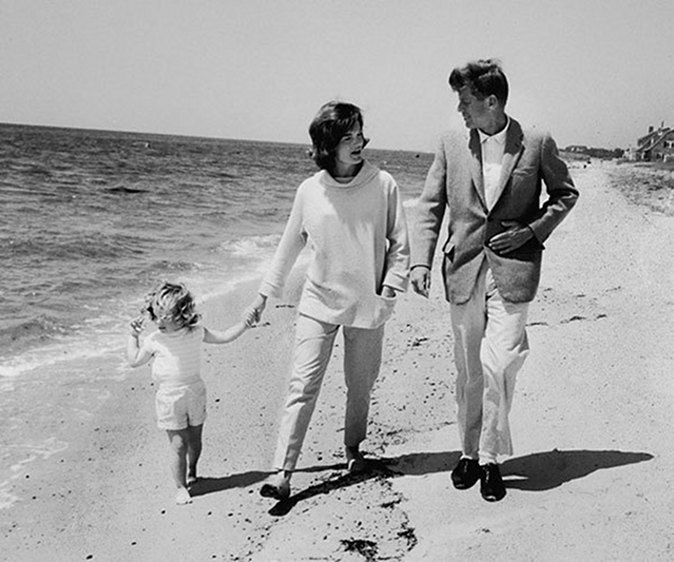
Tomorrow: Part II: The Glamour and Grime of the Foreign TV Correspondent

Thank you for sharing Mario’s story. These posts raise some questions for me. I understand the value of a reporter knowing a lot of people. In the case of a reporter who covers the same individual for a long period of time, I suspect a mutual trust may develop. At some point, the news maker may engage in behavior that should be reported, it strikes me that it would be very difficult for a reporter to cultivate such a relationship and then potentially destroy the relationship by reporting unfavorable facts.
Is this a real or illusory problem?
Prior to reading this particular posting I was aware that in an earlier day the press did overlook certain information that was not deemed necessary to report. I do not know if something critical was over looked by this practice, but I find it honorable in light of the salacious and partisan reporting and callous invasion of privacy that seems to appear all to frequently. For example phone hacking scandal in the UK.
I realize my comment is long and rambling and not worthy of public posting. I apologize for cluttering up your inbox. I admire the clarity of your writing. I look forward reading many more of your posts
John — Thank you for your interesting comment which is worthy of a lengthy response. Yes, journalists often get too close to the people they are covering and lose the necessary critical distance to do their job properly. I think that happened with JFK. I also heard it happened with Obama during the 2008 election campaign. Journalists got so enthusiastic and caught up in the excitement of his candidacy that they started promoting the “walk on water” myth. That sort of biased reporting isn’t good for a politician either. It sets them up for a fall. I think Obama has had a hard time living up to the myth that was created during the campaign.
A contrasting example is President Nixon. He was apparently so nasty to journalists that they were eager to “get” him. Perhaps so much so that they may have given too little emphasis to some of his better foreign policy decisions (relations with China to name one).
Another of my favorite examples is Bill Clinton. Clinton is a brilliant intellectual, and easy-going, touchy-feely charmer who loves to be loved. I have heard so many accounts of his ability to win people over from someone he meets on the campaign trail at a McDonald’s to rooms full of academic intellectuals. I’ve been told that Bill Clinton often gives warm handshakes, or will hold the person he is speaking to by the upper arm or put a hand around the shoulder. (I’m not referring to the womanizing here, that’s another issue) I think he won over a lot of reporters too with his combination of friendly low-key manner and brilliant mind. In contrast, Hillary Clinton is equally intellectual but does not have that natural touch with people. She does not seem to enjoy it as much. I have also seen her in person on various occasions and I can tell it is harder for her. My impression are that journalists are tougher on Hillary than on Bill.
Another example I saw up close is the coverage of Pope John Paul II in his later years. Some of the Vatican journalists were so enamored and in awe of him for his role in pushing for change in Soviet-era Poland and helping to end the Cold War, that they didn’t want to tackle the Vatican on the priestly pedophile crisis. It was talented journalists in the US–like my friend Michael Paulson at The Boston Globe- who pursued that story relentlessly and brought it to the attention of the world.
Another non-political example of someone who knows how to woo the press is George Clooney. I have seem in at several press conferences in Rome and he is charming, funny and gracious and leads people to believe he has all the time in the world just to answer their questions. I also door-stepped him once in a town near L’Aquila destroyed by an earthquake. (See post on Doorstepping Door-Stepping)
He stopped to answer my questions, despite the blistering heat, he appeared unsweaty (unlike me) and acted as though he would have been happy to stay there for hours answering my questions. As I was interviewing him he briefly put is hand on my upper arm as he was explaining something to me. I joked with my colleagues afterwards saying, “I am never going to wash that arm”. Now there is a perfect example of a journalist losing perspective!!
I hope you will keep on reading this week’s posts on Mario, because they raise tons of questions about how a journalist does his job.
Trisha, I am Mario’s son and I have always been on his case to write a book about his many adventures but he never seemed to have the time. Thus, I so very much appreciate and enjoy your writing. You capture the essence of my father and the news stories he covered very well. I also enjoy your commentary and your views on how news gathering has changed today. I remember growing up waiting for him to come home to hear his latest adventures. At times he would be away from home for many months so it was very hard on the family. During the summer months we vacationed at our beach house at San Felice Circeo and when Dad came home from his latest trip it was a veritable crowd that surrounded him around our beach umbrella for hours to hear what he had seen and reported on. Even to this day some of the kids that we grew up with still comment on how much they learned from listening to my father’s stories. He has some amazing photographs of where he has been and the world leaders that he has covered. I am sure that your readers will find them of interest. I also hope he tells you about his trips to India and Belfast. Different but both fascinating. I particularly like the one about “breakfast for two” with the eagle but I will let him share that with you. Best regards and thank you. Jon Biasetti.
Jon– Thank you for your note. I can just imagine your father had big crowds gathered around the family beach umbrellas as he recounted his tales. He has a crowd of journalists gathered around him every time he goes out in the field these days waiting to hear another Mario story. So far with me he has touched on India, but we haven’t gotten to Belfast, Tehran or Moscow. He definitely needs to write his own biography. His photos are fantastic too I am getting a kick out of choosing the ones I want for my blog. Hope to meet you someday in Rome. Trisha
Thank you, Trisha, this is great and a lot of fun! Ciao, Jon.
I always leave your blog with little “insider” tidbits to contemplate and share. The integrity of a journalist has taken on complexities I will see differently from now on. Thank you.
Kathleen, I am pleased to hear you found my post on Mario Biasetti stimulating. There are so many “integrity” questions related to a journalist’s job. The question of getting too close to the person you are covering is a big one, but there are lots of others — how you demonstrate both sides to a story, how you capture something visual at the right moment (there are fakers). There are also questions about how journalists work with each other. Journalists on a whole tend to by highly competitive individuals and can be quite capable of stabbing each other in the back. Sadly, I got some serious stabs in the back, especially from women, in the early years of my career– back when I was in my twenties and was young and ambitious. Once I started having children, people didn’t see me as a threat anymore and I got better treatment. I also wasn’t a threat any more to anyone. It is a well-known fact that it is difficult to maintain a demanding job in television and have kids, and I am not talking about being an anchor woman or someone sitting in a studio. I am talking about journalists out covering the stories. Interesting to think of Mario’s case. His job would have been nearly impossible for a woman with children.
Kathleen, I am pleased to hear you found my post on Mario Biasetti stimulating. There are so many “integrity” questions related to a journalist’s job. The question of getting too close to the person you are covering is a big one, but there are lots of others — how you demonstrate both sides to a story, how you capture something visual at the right moment (there are fakers). There are also questions about how journalists work with each other. Journalists on a whole tend to by highly competitive individuals and can be quite capable of stabbing each other in the back. Sadly, I got some serious stabs in the back, especially from women, in the early years of my career– back when I was in my twenties and was young and ambitious. Once I started having children, people didn’t see me as a threat anymore and I got better treatment. I also wasn’t a threat any more to anyone. It is a well-known fact that it is difficult to maintain a demanding job in television and have kids, and I am not talking about being an anchor woman or someone sitting in a studio. I am talking about journalists out covering the stories. Interesting to think of Mario’s case. His job would have been nearly impossible for a woman with children.